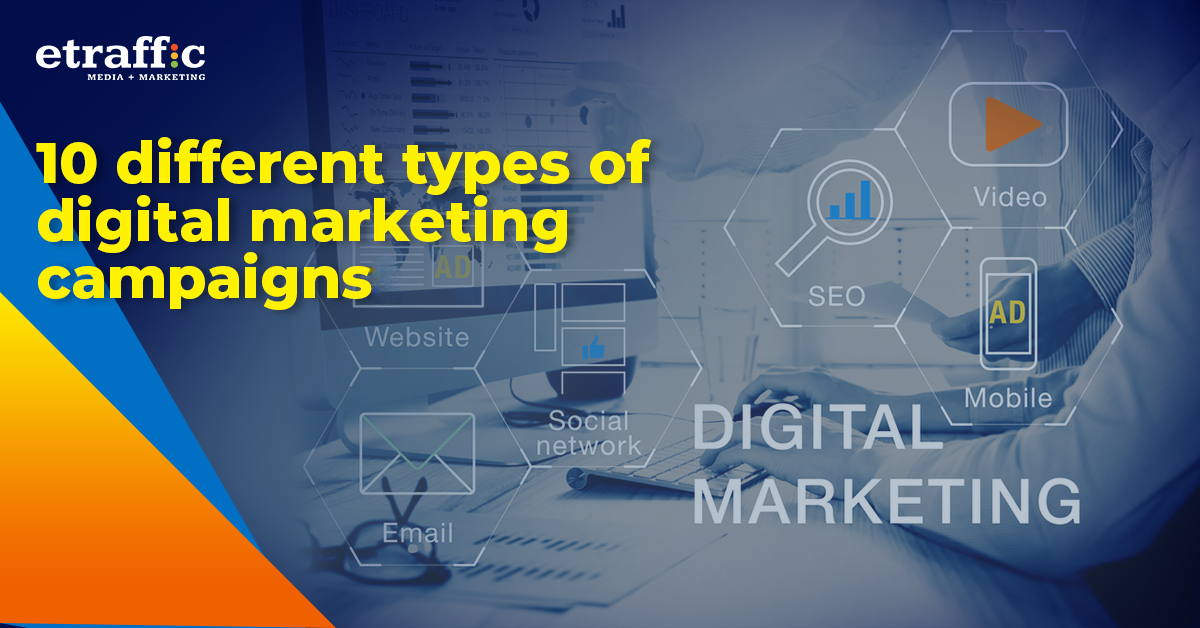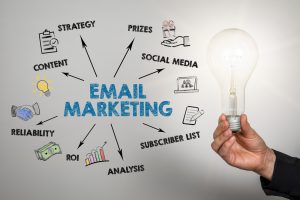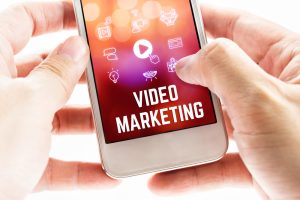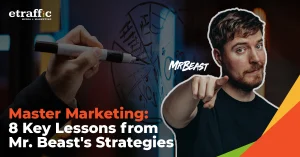![]() Posted by Cameron Francis
on
27 Apr , 2023
in
Digital Marketing
Posted by Cameron Francis
on
27 Apr , 2023
in
Digital Marketing

Before we get started, we need to address the elephant in the room – what is digital marketing? To put it simply, digital marketing refers to the various strategies and techniques employed by businesses to promote their products or services using digital channels such as search engines, social media platforms, email, and mobile apps.
With the rise of the internet and the increased use of mobile devices, digital marketing campaigns have become an essential tool for businesses to reach their target audience, increase brand awareness, and drive sales. So it is vital that we all understand the importance of digital marketing and how it can help our businesses.
Importance Of Digital Marketing Campaigns
In today’s fast-paced digital landscape, businesses cannot afford to neglect the importance of digital marketing initiatives. As more and more people spend their time online, it’s crucial for brands to establish a solid web presence in order to reach and interact with their target demographic. Businesses today can grow their customer base, increase sales, and increase brand awareness with the help of digital marketing efforts.
In addition, they supply organisations with insightful data that may be used to hone marketing techniques and boost returns. All things considered, digital marketing efforts are crucial to a company’s success and the growth of its bottom line.
In this blog, we will explore the various types of digital marketing in an effort to help you understand what may work best for your business. Please keep reading below to learn more today!
1). Search Engine Optimisation (SEO)
SEO is a process of optimising your website to rank higher in the search engine results pages (SERPs) for specific keywords related to your business. In simpler terms, SEO involves making changes to your website that make it more attractive to search engines. Search engines use complex algorithms to determine the relevance and authority of a website and rank it accordingly in the search results. SEO involves understanding these algorithms and optimising your website accordingly.
There are many factors that search engines consider when ranking websites. Some of the most important factors include the quality and relevance of the content on your website, the structure and technical elements of your website, and the number and quality of backlinks pointing to your site from other websites.
Benefits Of SEO
The benefits of SEO are numerous and can have a significant impact on your business. Here are some of the key benefits of SEO:
- Increased visibility in search engine results pages (SERPs): By optimising your website for search engines, you can improve your rankings in the search results pages and attract more clicks and traffic to your website.
- Improved website traffic and lead generation: Higher rankings in search results pages can lead to more targeted traffic to your website, which can lead to more leads and sales.
- Enhanced user experience and website usability: SEO involves optimising your website for both search engines and users. This can lead to a better user experience, better website usability, and ultimately, better engagement and conversions.
- Improved brand awareness and recognition: Higher rankings in search results pages can increase your brand’s visibility and recognition, leading to improved brand awareness and loyalty.
- Increased website credibility and authority: By optimising your website for search engines, you can improve its credibility and authority, making it more attractive to both search engines and users.
- Higher conversion rates and revenue generation: By attracting more targeted traffic to your website, you can increase your conversion rates and generate more revenue.
- Cost-effective long-term marketing strategy: SEO is a long-term marketing strategy that can provide a high return on investment over time. Unlike other forms of marketing, such as paid advertising, SEO can continue to drive traffic and leads to your website long after the initial investment has been made.
Techniques Used In SEO
The techniques used in SEO can be broadly classified into two categories: on-page and off-page optimisation.
On-page optimisation involves optimising your website’s content, structure, and technical elements to improve its relevance and usability for search engines and users. This includes:
- Keyword research: Identifying the most relevant keywords and phrases related to your business and incorporating them into your website’s content and meta tags.
- Content creation: Creating high-quality, relevant, and engaging content for your website that targets specific keywords and topics.
- Meta tags optimisation: Optimise your website’s title tags, meta descriptions, and header tags to make them more attractive to search engines and users.
- URL structure: Creating a clear and concise URL structure for your website that is easy for both search engines and users to understand.
- Site architecture: Creating a clear and organised site architecture that makes it easy for search engines to crawl and index your website.
- Mobile optimisation: optimising your website for mobile devices, including using a responsive design and ensuring that your website loads quickly on mobile devices.
Off-page optimisation involves building high-quality backlinks from other websites to your site, social media marketing, and local SEO optimisation. This includes:
- Link building: Build high-quality, relevant, and authoritative backlinks from other websites to your site.
- Social media marketing: Using social media platforms to promote your website and build your brand’s online presence.
- Local SEO optimisation: optimising your website for local search, including creating a Google My Business page and building local citations.

2). Explanation Of PPC Advertising
Pay-per-click (PPC) advertising is a form of digital advertising where advertisers pay each time a user clicks on one of their ads. PPC ads are typically displayed at the top of search engine results pages (SERPs) or on websites and social media platforms. Advertisers bid on specific keywords or phrases that are relevant to their business, and their ads are displayed to users who are searching for those keywords.
PPC advertising is a highly targeted form of advertising because advertisers can choose who sees their ads based on factors such as location, demographics, and interests. This makes PPC advertising an effective way to reach a specific target audience and drive targeted traffic to your website.
Benefits Of PPC advertising
PPC advertising offers many benefits for businesses, including:
- Targeted advertising: PPC advertising allows businesses to target specific keywords, demographics, and locations, ensuring that their ads are seen by the right audience.
- Increased brand exposure: PPC advertising can help businesses increase their brand exposure by placing their ads at the top of search engine results pages and on popular websites and social media platforms
- Immediate results: Unlike other forms of advertising, such as SEO, PPC advertising can generate immediate results by driving targeted traffic to your website.
- Cost-effective: PPC advertising is a cost-effective form of advertising because advertisers only pay when someone clicks on their ad. This means that businesses can control their advertising costs and ensure that they are getting a good return on investment.
- Measurable results: PPC advertising provides businesses with detailed analytics and tracking, allowing them to measure the success of their campaigns and make data-driven decisions.
Techniques Used In PPC advertising
To create effective PPC advertising campaigns, businesses use a variety of techniques, including:
- Keyword research: Identifying the most relevant keywords and phrases that are likely to drive targeted traffic to your website.
- Ad copywriting: Creating compelling ad copy that highlights the benefits of your products or services and encourages users to click on your ad.
- Ad targeting: Target your ads to specific demographics, locations, and interests to ensure they are seen by the right audience.
- Bid management: Managing your bids to ensure that your ads are displayed at the right time and in the right position on search engine results pages.
- Landing page optimisation: Creating landing pages that are optimised for conversion and that provide users with a clear call to action.
- Analytics and tracking: Measuring the success of your campaigns using detailed analytics and tracking tools and making data-driven decisions to optimise your campaigns.
As we can see, PPC advertising is a highly effective form of digital advertising that can help businesses reach their target audience, drive targeted traffic to their website, and increase their brand exposure. By using the right techniques and strategies, businesses can create successful PPC advertising campaigns that provide a high return on investment.

3). Social Media Marketing
Social media marketing refers to using social media platforms to promote a business’s products or services. Social media platforms, such as Facebook, Twitter, Instagram, and LinkedIn, provide businesses with the ability to reach a large audience, engage with their target customers, and build brand awareness and loyalty.
Social media marketing involves creating and sharing content on social media platforms that is relevant and engaging to your target audience. This can include creating posts, videos, images, and infographics that provide value to your customers and encourage them to engage with your brand.
Benefits Of Social Media Marketing
Social media marketing offers many benefits for businesses, including:
- Increased brand awareness: Social media platforms provide businesses with the ability to reach a large audience and increase their brand awareness and recognition.
- Improved customer engagement: Social media platforms allow businesses to engage with their customers in real time, responding to their questions and concerns and building stronger relationships.
- Targeted advertising: Social media advertising allows businesses to target specific demographics, interests, and behaviours, ensuring that their ads are seen by the right audience.
- Increased website traffic: Social media marketing can drive traffic to your website by including links to your website in your social media posts and advertising.
- Cost-effective: Social media marketing is a cost-effective form of marketing because it is free to create a social media account and post content, and social media advertising can be targeted to specific demographics, ensuring that businesses are only paying to reach their target audience.
- Measurable results: Social media marketing provides businesses with detailed analytics and tracking, allowing them to measure the success of their campaigns and make data-driven decisions.
Techniques Used In social media marketing
To create effective social media marketing campaigns, businesses use a variety of techniques, including:
- Content creation: Creating engaging and relevant content that resonates with your target audience and encourages them to engage with your brand.
- Social media advertising: Using social media advertising to target specific demographics and reach a larger audience.
- Influencer marketing: Partnering with influencers or individuals with a large social media following to promote your brand.
- Social media contests and promotions: Creating contests and promotions on social media platforms to encourage engagement and increase brand awareness.
- Analytics and tracking: Measuring the success of your social media campaigns using detailed analytics and tracking tools and making data-driven decisions to optimise your campaigns.
Using social media marketing can be an effective tool for businesses to reach their target audience, increase brand recognition and loyalty, and boost website traffic. With the use of the proper techniques and strategies, businesses can create successful social media marketing campaigns that offer a significant return on investment.

4). Content Marketing
Content marketing is a digital marketing strategy that involves creating and sharing valuable, relevant, and engaging content to attract and retain a specific target audience. Content marketing can take many forms, including blog posts, articles, videos, infographics, podcasts, and social media posts.
The goal of content marketing is to create content that provides value to your target audience and encourages them to engage with your brand. This can lead to increased brand awareness, improved customer engagement and loyalty, and ultimately, increased sales.
Benefits Of Content Marketing
Content marketing offers many benefits for businesses, including:
- Increased brand awareness: Creating high-quality content can help businesses increase their brand awareness and recognition.
- Improved customer engagement: Providing valuable content can help businesses build stronger relationships with their customers and encourage them to engage with their brand.
- Increased website traffic: Creating and sharing valuable content can drive traffic to your website and improve your website’s search engine rankings.
- Cost-effective: Content marketing can be a cost-effective form of marketing because it is free to create and share content.
- Measurable results: Content marketing provides businesses with detailed analytics and tracking, allowing them to measure the success of their campaigns and make data-driven decisions.
Techniques Used In Content Marketing
To create effective content marketing campaigns, businesses use a variety of techniques, including:
- Content creation: Creating high-quality, valuable, and engaging content that resonates with your target audience.
- Content optimisation: optimising your content for search engines and social media platforms, ensuring that it is easy to find and share.
- Content distribution: Sharing your content on social media platforms, email marketing campaigns, and other digital marketing channels to increase its reach and engagement.
- Content repurposing: Repurposing your content into different formats, such as videos or infographics, to reach a wider audience and provide value in different ways.
- Influencer marketing: Partnering with influencers or individuals with a large following to promote your content and reach a wider audience.
- Analytics and tracking: Measuring the success of your content marketing campaigns using detailed analytics and tracking tools and making data-driven decisions to optimise your campaigns.
Content marketing is a robust approach that can assist businesses in reaching their intended audience, developing brand recognition and loyalty, and ultimately, growing their revenue. By utilising effective techniques and strategies, businesses can generate successful content marketing campaigns that offer a notable ROI.

5). Email Marketing
Email marketing is a digital marketing strategy that involves sending promotional emails to a list of subscribers who have opted in to receive communications from your business. Email marketing can take many forms, including newsletters, promotional offers, event invitations, and customer surveys.
The goal of email marketing is to build relationships with your subscribers, promote your brand, and encourage them to take action, such as making a purchase or visiting your website.
Benefits Of Email Marketing
Email marketing offers many benefits for businesses, including:
- Increased brand awareness: Email marketing allows businesses to reach a large audience and increase their brand awareness and recognition.
- Improved customer engagement: Providing valuable content and personalised offers through email can help businesses build stronger relationships with their customers and encourage them to engage with their brand.
- Increased website traffic: Email marketing can drive traffic to your website by including links to your website in your emails.
- Cost-effective: Email marketing is a cost-effective form of marketing because it is relatively inexpensive to send emails to a large number of subscribers.
- Measurable results: Email marketing provides businesses with detailed analytics and tracking, allowing them to measure the success of their campaigns and make data-driven decisions.
Techniques Used In Email Marketing
To create effective email marketing campaigns, businesses use a variety of techniques, including:
- Email list building: Building a list of subscribers who have opted in to receive communications from your business.
- Personalisation: Personalising emails with the subscriber’s name and other relevant information to make the email more engaging and relevant.
- Email segmentation: Segmenting your email list based on demographics, interests, and behaviours to ensure that your emails are targeted to the right audience.
- A/B testing: Testing different email subject lines, content, and offers to determine which emails are most effective.
- Email automation: Setting up automated email campaigns, such as welcome emails and abandoned cart emails, to engage with subscribers and encourage them to take action.
- Analytics and tracking: Measuring the success of your email marketing campaigns using detailed analytics and tracking tools and making data-driven decisions to optimise your campaigns.
Email marketing is a clever way to develop email marketing campaigns that yield a substantial return on investment. It is a super-intelligent approach that enables businesses to reach their intended audience, build brand recognition and loyalty, and ultimately, enhance their profitability.

6). Influencer Marketing
Influencer marketing is a digital marketing strategy that involves partnering with individuals who have a large social media following or influence in a particular industry or niche. The goal of influencer marketing is to leverage the influencer’s reach and influence to promote your products or services and reach a wider audience.
Influencer marketing can take many forms, including sponsored posts, product reviews, and brand collaborations. Influencers can promote your brand to their followers through social media posts, blog posts, or other forms of content.
Benefits Of Influencer Marketing
Influencer marketing offers many benefits for businesses, including:
- Increased brand awareness: Influencers can promote your brand to their followers, increasing your brand awareness and exposure.
- Improved customer engagement: Influencers can help businesses build stronger relationships with their customers and encourage them to engage with their brand.
- Targeted advertising: Influencers can target their posts to specific demographics, ensuring that their posts are seen by the right audience.
- Authenticity: Influencers are seen as trusted sources of information, and their endorsements can provide a level of authenticity and credibility that traditional advertising may not be able to achieve.
- Cost-effective: Influencer marketing can be a cost-effective form of advertising because businesses only pay for the influencer’s services and can often negotiate lower rates than traditional advertising.
- Measurable results: Influencer marketing provides businesses with detailed analytics and tracking, allowing them to measure the success of their campaigns and make data-driven decisions.
Techniques Used In Influencer Marketing
To create effective influencer marketing campaigns, businesses use a variety of techniques, including:
- Influencer research: Identifying influencers who are relevant to your industry or niche and have a large following.
- Influencer outreach: Reaching out to influencers and establishing a partnership or collaboration.
- Sponsored content: Paying influencers to create sponsored content, such as social media posts or blog posts, that promote your brand.
- Product reviews: Providing influencers with products or services to review and share their opinions with their followers.
- Brand collaborations: Collaborating with influencers on a branded campaign, such as a giveaway or product launch.
- Analytics and tracking: Measuring the success of your influencer marketing campaigns using detailed analytics and tracking tools and making data-driven decisions to optimise your campaigns.
Influencer marketing is a powerful tool for businesses to expand their reach, build brand recognition, and drive sales. Partnering with relevant influencers can tap into their established trust and credibility with their engaged audience. It’s also a cost-effective way to reach a target audience and achieve marketing goals in the digital space.

7). Affiliate Marketing
Affiliate marketing is a digital marketing strategy that involves partnering with affiliates who promote your products or services in exchange for a commission on sales. Affiliates can include bloggers, influencers, and other businesses that have a relevant audience and are interested in promoting your products or services.
Affiliate marketing typically involves providing affiliates with a unique link or code that they can use to promote your products or services to their audience. When someone clicks on an affiliate’s link and makes a purchase, the affiliate earns a commission on the sale.
Benefits Of Affiliate Marketing
Affiliate marketing offers many benefits for businesses, including:
- Increased sales: Affiliate marketing can drive sales by leveraging the reach and influence of affiliates.
- Cost-effective: Affiliate marketing is a cost-effective form of marketing because businesses only pay a commission on sales, rather than paying for advertising upfront.
- Targeted advertising: Affiliates can target their promotions to specific demographics, ensuring that their promotions are seen by the right audience.
- Measurable results: Affiliate marketing provides businesses with detailed analytics and tracking, allowing them to measure the success of their campaigns and make data-driven decisions.
- Increased brand awareness: Affiliate marketing can increase your brand awareness and exposure by reaching a wider audience through the promotions of affiliates.
- Third-party validation: Affiliate marketing provides businesses with third-party validation, as affiliates are seen as trusted sources of information and their endorsements can provide authenticity and credibility.
Techniques Used In Affiliate Marketing
To create effective affiliate marketing campaigns, businesses use a variety of techniques, including:
- Affiliate recruitment: Recruiting affiliates who have a relevant audience and are interested in promoting your products or services.
- Affiliate tracking: Tracking the sales and commissions generated by affiliates using unique links or codes.
- Commission structure: Setting a commission structure that provides affiliates with an incentive to promote your products or services.
- Affiliate promotion: Providing affiliates with promotional materials, such as banner ads and email templates, to make it easier for them to promote your products or services.
- Analytics and tracking: Measuring the success of your affiliate marketing campaigns using detailed analytics and tracking tools and making data-driven decisions to optimise your campaigns.
Affiliate marketing is a valuable strategy for businesses to expand their reach and drive sales through partnerships with affiliates. It’s a cost-effective form of advertising that can establish mutually beneficial relationships with partners and increase brand recognition.

8). Video Marketing
Video marketing is a digital marketing strategy that involves creating and sharing videos to promote your products or services. Video marketing can take many forms, including product demos, tutorials, explainer videos, and brand videos.
The goal of video marketing is to create engaging and informative videos that provide value to your target audience and encourage them to take action, such as making a purchase or visiting your website.
Benefits Of Video Marketing
Video marketing offers many benefits for businesses, including:
- Increased engagement: Video is a highly engaging form of content that can capture and hold the attention of your target audience.
- Increased brand awareness: Videos can help businesses increase their brand awareness and recognition by reaching a larger audience.
- Improved customer engagement: Videos can help businesses build stronger relationships with their customers and encourage them to engage with their brand.
- Increased website traffic: Video marketing can drive traffic to your website by including links to your website in your videos.
- Cost-effective: Video marketing can be a cost-effective form of marketing because it can be produced and shared on a variety of platforms, including social media and YouTube.
- Measurable results: Video marketing provides businesses with detailed analytics and tracking, allowing them to measure the success of their campaigns and make data-driven decisions.
Techniques Used In Video Marketing
To create effective video marketing campaigns, businesses use a variety of techniques, including:
- Video production: Creating high-quality, informative, and engaging videos that resonate with your target audience.
- Video optimisation: Optimise your videos for search engines and social media platforms, ensuring that they are easy to find and share.
- Video distribution: Sharing your videos on social media platforms, YouTube, and other digital marketing channels to increase their reach and engagement.
- Video advertising: Running video ads on social media platforms and YouTube to reach a larger audience and promote your brand.
- Video repurposing: Repurposing your videos into different formats, such as shorter clips for social media or blog posts, to reach a wider audience and provide value in different ways.
- Analytics and tracking: Measuring the success of your video marketing campaigns using detailed analytics and tracking tools and making data-driven decisions to optimise your campaigns.
Video marketing is a highly effective tool for businesses to increase engagement, build brand awareness, and drive sales. It’s a cost-effective way to reach a large audience and provides detailed analytics for data-driven decision-making.

9). Mobile Marketing
Mobile marketing is a digital marketing strategy that involves reaching your target audience on their mobile devices, such as smartphones and tablets. Mobile marketing can take many forms, including mobile-optimised websites, mobile apps, SMS marketing, and mobile advertising.
The goal of mobile marketing is to provide a seamless and convenient experience for your target audience on their mobile devices and to deliver personalised and relevant content that encourages them to engage with your brand.
Benefits Of Mobile Marketing
Mobile marketing offers many benefits for businesses, including:
- Increased reach: Mobile devices are ubiquitous and reach a large portion of the population, making mobile marketing an effective way to reach your target audience.
- Improved customer engagement: Mobile marketing can help businesses build stronger relationships with their customers by delivering personalised and relevant content.
- Enhanced customer experience: Mobile marketing can provide a seamless and convenient experience for your customers on their mobile devices.
- Cost-effective: Mobile marketing can be a cost-effective form of marketing because it can be targeted to specific demographics and audiences.
- Measurable results: Mobile marketing provides businesses with detailed analytics and tracking, allowing them to measure the success of their campaigns and make data-driven decisions.
Techniques Used In Mobile Marketing
To create effective mobile marketing campaigns, businesses use a variety of techniques, including:
- Mobile-optimised websites: Creating websites that are optimised for mobile devices and provide a seamless and convenient experience for users.
- Mobile apps: Developing mobile apps that provide value to your customers and encourage them to engage with your brand.
- SMS marketing: Using text messages to deliver promotions, offers, and other content to your customers.
- Mobile advertising: Running mobile ads on social media platforms and mobile apps to reach a larger audience and promote your brand.
- Location-based marketing: Delivering targeted content to users based on their location, such as offering a promotion to customers who are near your store.
- Analytics and tracking: Measuring the success of your mobile marketing campaigns using detailed analytics and tracking tools and making data-driven decisions to optimise your campaigns.
Mobile marketing is a powerful tool for businesses to enhance customer engagement, reach their target audience, and drive sales. It’s an affordable way to provide a seamless experience for customers and offers detailed analytics for optimisation.

10). Display advertising
Display advertising is a digital marketing strategy that involves placing visual ads on websites, social media platforms, and other digital channels. Display ads can take many forms, including banners, pop-ups, and video ads.
The goal of display advertising is to increase brand awareness, drive traffic to your website, and encourage users to take action, such as making a purchase or signing up for a newsletter.
Benefits Of Display Advertising
Display advertising offers many benefits for businesses, including:
- Increased brand awareness: Display ads can help businesses increase their brand awareness and recognition by reaching a large audience.
- Targeted advertising: Display ads can be targeted to specific demographics and interests, ensuring that they are seen by the right audience.
- Increased website traffic: Display advertising can drive traffic to your website by including links to your website in your ads.
- Cost-effective: Display advertising can be a cost-effective form of marketing because businesses can set a budget and pay only for the clicks or impressions they receive.
- Measurable results: Display advertising provides businesses with detailed analytics and tracking, allowing them to measure the success of their campaigns and make data-driven decisions.
Techniques Used In Display Advertising
To create effective display advertising campaigns, businesses use a variety of techniques, including:
- Ad design: Creating visually appealing ads that resonate with your target audience and promote your brand.
- Ad targeting: Targeting your ads to specific demographics, interests, and behaviours to ensure that your ads are seen by the right audience.
- Ad placement: Placing your ads on websites, social media platforms, and other digital channels that your target audience frequents.
- A/B testing: Testing different ad designs, targeting, and placement to determine which ads are most effective.
- Retargeting: Targeting users who have previously visited your website or interacted with your brand with display ads to encourage them to return to your website and take action.
- Analytics and tracking: Measuring the success of your display advertising campaigns using detailed analytics and tracking tools and making data-driven decisions to optimise your campaigns.
Overall, display advertising is a powerful tool that can help businesses reach their target audience, increase brand awareness, and drive traffic to their website. By using the right techniques and strategies, businesses can create successful display advertising campaigns that provide a high return on investment.

Summary Of Digital Marketing Campaigns
Digital marketing campaigns are a set of strategies and techniques used by businesses to promote their products or services online. There are several types of digital marketing campaigns, including search engine optimisation (SEO), pay-per-click (PPC) advertising, social media marketing, content marketing, email marketing, influencer marketing, affiliate marketing, video marketing, mobile marketing, and display advertising.
Choosing The Right Digital Marketing Campaign For Your Business
When choosing the right digital marketing campaign for your business, it’s important to consider your target audience, budget, and business goals. Each type of digital marketing campaign has its own set of benefits and techniques, and it’s important to choose the one that aligns with your business needs and objectives.
For example, if you want to increase your website traffic, SEO and PPC advertising may be the right choice for your business. If you want to increase brand awareness and engagement, social media marketing and influencer marketing may be more effective. If you want to drive sales and revenue, affiliate marketing and email marketing may be the best options.
Final Thoughts
Digital marketing campaigns are essential for businesses to reach their target audience, build brand awareness and loyalty, and ultimately, increase their bottom line. By using the right techniques and strategies, businesses can create successful digital marketing campaigns that provide a high return on investment. It’s important to stay up-to-date with the latest trends and technologies in digital marketing to ensure that your campaigns are effective and successful.
Contact ETRAFFIC For Your Digital Marketing Needs
If you’re ready to take your digital marketing campaigns to the next level, contact ETRAFFIC today! Our team of experts can help you create effective and successful digital marketing strategies that align with your business goals and drive results. Contact us now to learn more!
Please call us at ETRAFFIC today at 1300 887 151 or book a free strategy session below.






